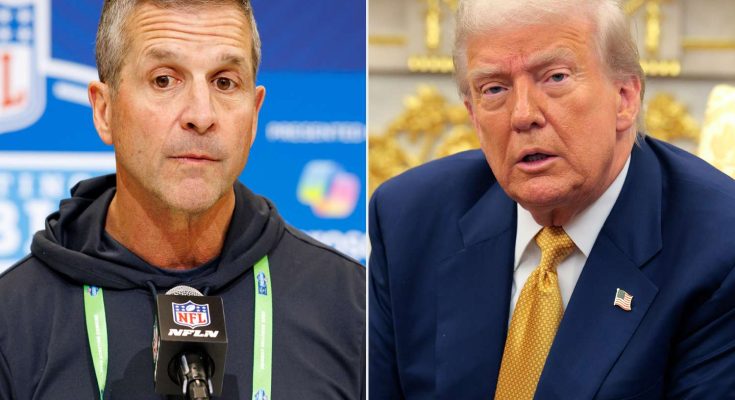Baltimore Ravens head coach John Harbaugh has never been one to seek out the spotlight for anything other than football. Known for his laser-sharp focus on leadership, discipline, and consistent improvement, Harbaugh has built a culture in Baltimore that prioritizes hard work, accountability, and unity. So when news surfaced that he had visited with former President Donald Trump recently, the reaction from the broader public was understandably filled with curiosity. Political affiliations aside, Harbaugh’s explanation of the meeting was plainspoken and free from sensationalism. To him, it wasn’t about partisan issues or grandstanding. It was simply, in his own words, “another great opportunity to meet a chief executive.”
Harbaugh’s perspective aligns well with the role he’s always maintained in public life. He sees himself as a servant leader, responsible for molding young men into high-character professionals while winning football games at the highest level. Meeting a president, regardless of who is in office, falls within the realm of experiences that few Americans ever get to have. As Harbaugh explained to reporters, it wasn’t the first time he had been around a commander-in-chief, and it likely won’t be the last, given his stature in one of America’s most visible sports. The importance for Harbaugh was the opportunity to listen, learn, and express appreciation for the position of president, not to signal political allegiance.
The Ravens organization, like many NFL franchises, walks a delicate line when its personnel and leadership engage in politically tinged events. In the era of social media, polarized discourse, and intense media scrutiny, even something as routine as visiting the White House or accepting a presidential invitation can become a cultural flashpoint. Harbaugh, however, has largely been immune to the controversies that have snared others in similar positions. That’s not by accident. Over his tenure, he has developed a reputation for being measured, thoughtful, and reluctant to say anything inflammatory, especially on topics that go beyond the gridiron. In this case, he kept that same posture, ensuring his visit wasn’t painted as anything other than what it was—an interaction with a past president and a chance to exchange perspectives on leadership and responsibility.
The specifics of the meeting weren’t widely disclosed. Harbaugh made it clear that it was a private affair, held at the request of Trump, and included others from the football and military worlds. While the media tried to read between the lines, looking for hidden motives or broader implications, Harbaugh sidestepped any speculation. What he emphasized most in the few interviews he gave afterward was his appreciation for civil service and his continued admiration for the office of the presidency. He spoke about American ideals and the unique fabric of the country—how differing ideas and diverse people can still respect each other, work together, and share in dialogue, even if they disagree. That tone, rare in today’s climate, resonated with many who have grown weary of the constant divisions in public life.
This isn’t the first time John Harbaugh has spoken openly about leadership in broader contexts than football. Over the years, he’s been invited to speak at military academies, leadership summits, and community development forums. His style—often a mixture of motivational clarity and Midwestern humility—has earned him the trust of players, executives, and fans alike. When he discusses topics like responsibility, discipline, and teamwork, he rarely confines those themes to sports. To Harbaugh, leadership is leadership, whether it’s guiding a locker room full of elite athletes or navigating the pressures of a national office.
While some may question the optics of meeting with a polarizing figure like Donald Trump, Harbaugh doesn’t seem concerned. He views such moments through the lens of opportunity and learning rather than alignment or endorsement. He talked about how important it is for Americans, especially those in influential positions, to remain open to conversations across political lines. In his mind, shutting down dialogue simply because of differing beliefs doesn’t serve the long-term health of the country. That level-headedness is one of the reasons he’s been able to sustain success in one of the NFL’s most competitive and high-pressure jobs. Harbaugh preaches unity in his locker room, and he lives it in his personal life.
There is also a deep connection between Harbaugh and the military, which helped frame this meeting in a different light. Harbaugh has long championed veterans’ causes, visited troops overseas, and incorporated military values into his team’s culture. That context may help explain why he would accept an invitation from any president, regardless of party, who wanted to talk about patriotism, service, and national unity. Harbaugh views these ideals as nonpartisan, timeless, and central to what binds Americans together. When he spoke about the visit, he noted that the discussions included themes of perseverance, American exceptionalism, and the importance of civic responsibility. For a coach who often uses metaphors from military service to inspire his team, this was more than just a polite handshake—it was an extension of the values he already promotes daily.
The Ravens, for their part, have been largely silent on the visit, neither promoting nor condemning it. That decision appears to be in line with the organization’s longstanding philosophy of allowing coaches and players the space to engage in public life on their own terms. It’s a refreshing contrast to the more performative statements often seen from major brands and sports franchises today. The organization’s trust in Harbaugh is well-earned; he’s the longest-tenured coach in franchise history and has consistently brought stability, vision, and success to Baltimore.
Players who spoke off the record about Harbaugh’s visit expressed little surprise. Many described him as a man of principle who would meet anyone with whom he could have a respectful, honest conversation. Others noted that Harbaugh frequently encourages his players to be active citizens, to vote, to educate themselves on issues, and to find their voices. His visit with Trump, then, wasn’t out of character—it was simply another chapter in the coach’s ongoing journey as a thoughtful public figure and mentor.
In a sports culture where hot takes, controversy, and outrage often dominate the headlines, Harbaugh’s approach feels almost revolutionary in its simplicity. He doesn’t posture, grandstand, or force messages down people’s throats. Instead, he models a form of quiet strength and intellectual curiosity that has allowed him to thrive in a difficult profession. By treating his visit with a former president as a learning moment rather than a publicity stunt, Harbaugh reminded people of a time when civility and curiosity were not considered signs of weakness.
For younger players watching, this is a valuable lesson. Football doesn’t exist in a vacuum. The people who play and coach the sport are also citizens, fathers, brothers, and neighbors. Harbaugh’s decision to engage with a controversial figure may not have been popular in every circle, but it was done thoughtfully and in a manner consistent with his character. In doing so, he showed that engagement doesn’t require endorsement, and dialogue doesn’t always mean agreement.
The political and sports worlds will undoubtedly continue to intersect in complex ways. As athletes and coaches gain bigger platforms and larger followings, the pressure to take sides or make statements will only grow. But leaders like Harbaugh serve as a reminder that nuance still has a place. He didn’t turn the meeting into a campaign event. He didn’t criticize those who might disagree with him. He didn’t even try to justify the optics. He simply said what it was—a chance to sit down with a former president and have a meaningful conversation about the country they both care about.
John Harbaugh’s reputation as a players’ coach, a man of faith, and a principled leader is unlikely to be diminished by this visit. If anything, it may have strengthened the view that he remains a rare figure in modern sports—someone who balances success with substance and isn’t afraid to take the occasional risk if it means standing by what he believes. Whether one agrees with the meeting or not, the manner in which Harbaugh handled the situation is a case study in how to lead with dignity in the public eye. And in a time when public figures are often pulled in every direction, that kind of grounded leadership is more valuable than ever.



